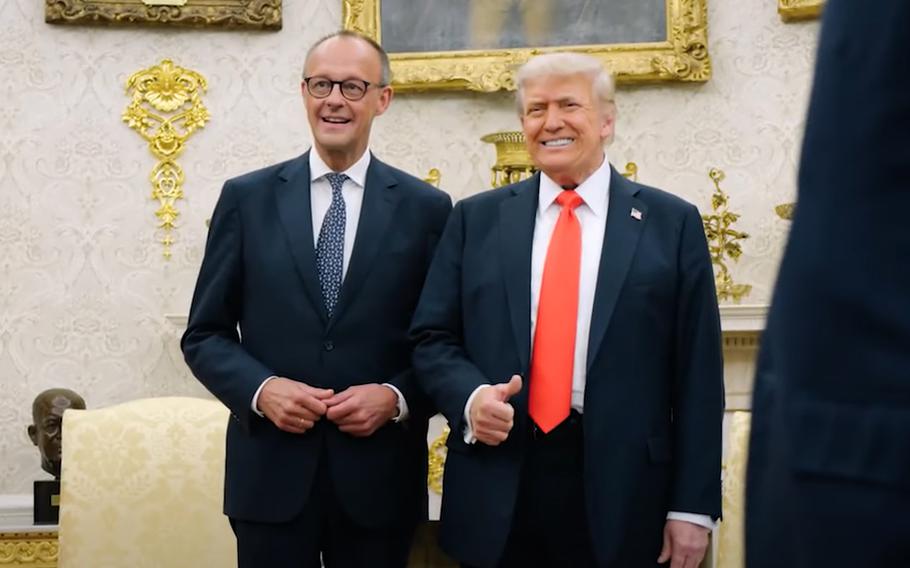
German Chancellor Friedrich Merz, left, poses with President Donald Trump in this still from a video taken during Merz’s visit to the White House on June 5, 2025. (The White House)
News regarding Europe is preoccupied with the Ukraine war and the latest Washington surprises, but other developments are important. Among the most important is the positive, effective leadership role of Germany.
On July 17 the Kensington Treaty was signed by German Chancellor Friedrich Merz and British Prime Minister Keir Starmer in London. The new treaty deepens cooperation in defense, migration, trade and other matters.
Merz also called for greatly increased cooperation among the two nations and France.
This is a complement to the new Anglo-French agreement to coordinate nuclear weapons strategy. Historically, Britain has been closely tied to the United States in this regard.
Historically as well, France was distinctive for pursuit of policies independent of Washington regarding nuclear weapons and other matters. Conflict reached a height of intensity during the Kennedy administration, when an assertive American president figuratively collided directly with imperious President Charles de Gaulle of France.
Recent years have brought steady low-key reconciliation across the Atlantic. In 2009, France rejoined NATO after dramatically rejecting the organization, and forcing NATO headquarters out of Paris, in 1966.
Merz also scored a diplomatic success with his visit to President Donald Trump at the White House on June 5. In contrast to the disastrous meeting between embattled President Volodymyr Zelenskyy of Ukraine and Trump, the session with Merz was calm, friendly and productive.
Given the volatile nature of the U.S. leader, this is a well-deserved tribute to the interpersonal skill, personal discipline and human insight of Germany’s head of government.
In very concrete terms, Germany is demonstrating leadership of Europe and the larger Atlantic area alliance in creating the path to greater defense spending. This expands support of Ukraine in the continuing brutal war with Russia.
Germany’s defense spending is projected to rise from 95 billion euros in fiscal 2025 to 162 billion euros in fiscal 2029.
Trump suggested sending Patriot missile defense systems to Germany so that the systems already in that nation’s possession could be forwarded to Ukraine. This is significant given the U.S. leader’s past negative words about NATO.
Generally at least, Germany leading the way in increasing defense spending, joined by other members of the alliance, helps U.S. companies and therefore our own economy. A total of 63% of Europe’s weapons and related military needs are supplied by U.S. defense companies.
Where corporate profits and the business bottom line in military matters is concerned, the concept of differences between the two sides of the Atlantic Ocean is blurred.
The belief the U.S. is being taken advantage of by European nations is a prominent theme of the Trump administration. Actually, complaints about European allies failing to spend more on defense dates back to debate over goals established in 1952 at a conference in Lisbon, Portugal.
Yet during the Cold War, 300,000 U.S. forces in Europe were supported by host governments.
The close, effective cooperation between Germany’s (initially West Germany’s) and the United States’ militaries has been a crucial factor in stability during the Cold War and since. Far-sighted U.S. leadership has been instrumental in ensuring Germany’s long-term positive economic, political and now diplomatic success and leadership.
Most fundamentally, Germany’s success and positive leadership today indicates Europe overall has moved beyond the ideologies that were so destructive in the 20th century.
Communism took root in Imperial Russia, aided by Germany, and succeeded thanks to the enormous costs of World War I and the chaotic aftermath. Threat of communism, along with awful economic misery, spawned fascism and Nazism, and World War II. Finally, the advance of communism helped generate the Cold War.
Dedication and discipline of earlier U.S. leaders was crucial to ultimate victory in the World Wars and the Cold War. Democratic Germany is a particularly important consequence.
Arthur I. Cyr is author of “After the Cold War — American Foreign Policy, Europe and Asia.”